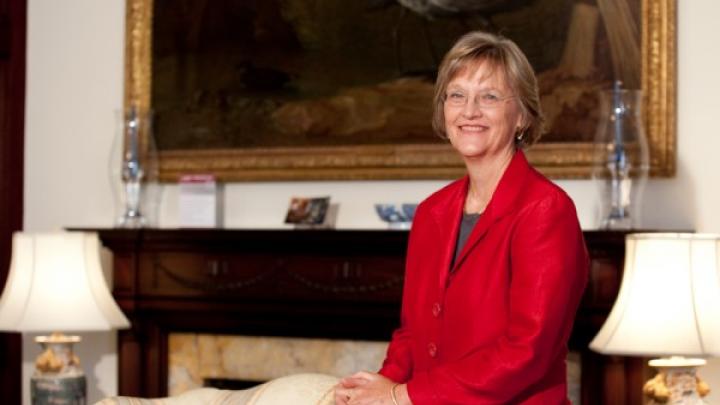Updated September 3, 2013, at 5:10 p.m. This dispatch has been retitled; due to a recording error, the president's phrase "Let us begin again" was originally reported as using the word "anew" instead. The quote is also corrected below, and a link has been posted to the transcript of her remarks, which was not available earlier.
Beginning the seventh academic year of her tenure in Massachusetts Hall, President Drew Faust spoke at morning prayers in Memorial Church, as is now presidential custom on the first day of classes. Following "Festive Processional," by Carson P. Cooman '04, the Reverend Jonathan L. Walton, Pusey minister and Plummer professor of Christian morals, led the congregation in a responsive reading of Psalm 15. After the choir sang the anthem of the day, "Schenectady," Walton's reading from Ecclesiastes 3 ("To every thing there is a season…") concluded with "…a time of war, and a time of peace"—perhaps echoing the concern in the muggy world outside about the dangerous situation in Syria in the wake of suspected use of chemical weapons there.
President Faust then rose to note that she spoke on this occasion annually, acknowledging the new season and community members' renewal of academic purpose—a time of "change we at once embrace and regret," as the weather turns from summer to the quickening of New England autumn, as the light itself is altered, and as those on campus shift from a slower pace to a "new season of teaching and learning."
Universities, she noted, are among the oldest institutions in the world, and Harvard is the senior such institution in North America. As such, members of the community are "devoted observers of tradition," like that of the morning prayers service itself. Yet universities are a venue for constant change: in the annual decamping of a fresh crop of graduates and the arrival of their newly matriculating successors; and in the search for knowledge, the discovery that is at the essence of a research university's mission.
Elaborating that theme, Faust recalled the late Seamus Heaney, Litt. D.'98, the Nobel laureate who long taught at Harvard and whose "Villanelle for an Anniversary" has become the signature for the University's 350th-anniversary celebration in 1986 (and was reprised at the 375th-anniversary Commencement in May 2012). (The poet, who died last Friday, was the subject of a Harvard Magazine profile in 2006.) Heaney, she observed, "urged us to honor our past by looking to our future." As she quoted the sixteenth line of the poem ("Begin again"), she said members of the community did just that each day by expanding the store of knowledge.
Coming to terms with change mattered to universities especially today, she continued, as they "confront especially significant seasons of change ahead, in a world being fundamentally altered by new technologies, new global realities, and new popular pressures and expectations."
"Change is not easy," she said. "That seems to me at the heart of the message of Ecclesiastes 3. It confronts us with contradictions, juxtaposes gain and loss." Change "encompasses continuity even as it transcends it," she observed. Citing Confucius, she said, "They must change, who would be constant in happiness and wisdom."
Beginning the new year at Harvard, Faust urged, "[L]et us welcome the rhythm of change. But in doing so, let us sustain the aspects of our past that define us and that matter most. As we move through this era of transformation, let us remember, too, that different times and different seasons require us to do our work in different ways. It is in fact in welcoming and shaping change that we are best able to ensure that what matters most survives and thrives even as so much shifts and turns."
Entering upon the new season and new academic year, Faust said, "Let us begin again."
New Beginnings in Context
Beyond its resonances for the turning of the seasons and the resumption of school, Faust's message may be read as channeling the themes of The Harvard Campaign—the University's capital drive, scheduled for public unveiling the third weekend in September.
Faust and her senior leadership team have been talking about the challenging financial context for higher education as federal support for research falls under the current sequester and longer-term budget pressures. More broadly, she has been reprising themes first raised in her installation address, in 2007—where she also, understandably, marked "new beginnings" while emphasizing universities' unique accountability "to the past and to the future—not simply, or even primarily, to the present." That message has been subsequently sharpened and refined by the progress of technology and the pressure to focus on the economic returns from an education and on applied science and knowledge (perhaps, or in some quarters explicitly, at the expense of liberal learning for its own sake, and of education in the humanities). Resolving those tensions—encouraging philanthropic support for the very expensive investments forthcoming in applied sciences and engineering, for technologically enabled online learning, and more, all the while assuring Harvard's loyal supporters that the University is true to enduring values, to the intellectual integrity and physical importance of its traditional campus-based learning—is very much at the heart of the campaign mission. (Development-minded Harvard officials present at morning prayers can be forgiven for appending a second meaning to the line from Psalm 15, "They do not give their money in hope of gain....")
After a decade and more of challenges involving the University's leadership, its finances, and—in the wake of the 2012-2013 undergraduate cheating investigation and ensuing review of resident deans' e-mail accounts—its core values, The Harvard Campaign, and this seventh academic year of Drew Faust's presidency, are very much about "beginning again."
The president's text is available here.







